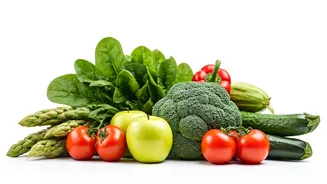Fat Fuels Your Body
One of the most persistent myths is that all fats are inherently bad and should be avoided. The truth is more nuanced. Healthy fats are essential for several
bodily functions, including hormone production and nutrient absorption. The article explains that not all fats are equal; unsaturated fats found in avocados, nuts, and olive oil are beneficial. On the other hand, it warns about the dangers of trans fats, often found in processed foods, which can increase the risk of heart disease. Understanding the different types of fats and their impact on health is crucial for making informed dietary choices. Choosing the right fats helps support overall health and well-being.
Carbs are Always Evil
Another widely believed fallacy is that carbohydrates should always be avoided. This section elucidates the importance of distinguishing between different types of carbs. It highlights the significance of whole grains, fruits, and vegetables, which provide essential fiber, vitamins, and minerals. It also cautions about excessive consumption of refined carbohydrates, such as white bread and sugary snacks, which can lead to blood sugar spikes and potential weight gain. Understanding the different roles of carbs and the importance of choosing nutrient-rich sources is pivotal in maintaining a balanced diet.
Protein Intake Overload
A common misconception involves the idea that excessive protein consumption is automatically beneficial. The text explains that while protein is vital for muscle growth, repair, and overall health, overconsumption can be detrimental. It explains that the body can only process a certain amount of protein at once, and excess protein is often stored as fat or eliminated. It stresses the importance of moderate protein intake and choosing lean protein sources like poultry, fish, and legumes. Adjusting protein intake based on individual needs and activity levels is key to optimizing health.
Calorie Restriction Is Best
The notion that extreme calorie restriction is the most effective approach to weight loss is debunked here. The article suggests that while calorie balance is important for managing weight, focusing solely on restriction can be harmful. It explains that severely limiting calories can lead to nutrient deficiencies, muscle loss, and a slower metabolism. It stresses the importance of a balanced diet rich in nutrient-dense foods, combined with regular physical activity, to facilitate sustainable weight management. The section advocates for a more holistic approach that prioritizes overall health over strict calorie counting.
Superfoods Are Magic
The misconception that particular 'superfoods' can magically solve all health problems is tackled in this section. While foods like blueberries, kale, and chia seeds offer unique nutritional benefits, they are not a cure-all. It's argued that a diverse diet rich in various fruits, vegetables, whole grains, and lean proteins is more important than focusing solely on a few superfoods. The section underscores that no single food can fulfill all nutritional needs and promote optimal health. It emphasizes the importance of a well-rounded diet to provide all necessary nutrients.
Supplements Replace Real Food
This part debunks the belief that nutritional supplements can replace a healthy diet. The piece explains that while supplements may be helpful in certain situations, such as addressing specific deficiencies or supporting overall health, they should not substitute whole foods. Whole foods provide a complex mix of nutrients, including vitamins, minerals, fiber, and phytochemicals, which work synergistically to support health. The section highlights the limited absorption and bioavailability of nutrients from supplements compared to natural sources. The focus remains on prioritizing whole foods for optimal nutrition and using supplements only when necessary.
Detox Is Essential
The concept of regular detoxing as a necessity for good health is challenged in this section. It explains that the body naturally detoxifies itself through the liver, kidneys, and other organs. The body efficiently eliminates toxins without the need for extreme cleanses or special products. It stresses that detox diets often lack essential nutrients and can be more harmful than helpful. The section advocates for a healthy diet, sufficient hydration, and regular physical activity to support the body's natural detoxification processes, rather than relying on unproven detox methods.
Snacking Hinders Weight Loss
The myth that snacking is inherently bad for weight loss is addressed here. It argues that mindful snacking can be part of a healthy diet, particularly when planned. It emphasizes the importance of choosing nutrient-dense snacks like fruits, vegetables, nuts, or Greek yogurt to curb hunger and prevent overeating. The section suggests that strategic snacking can prevent extreme hunger and overeating during meals. It promotes smart snacking choices rather than the complete elimination of snacks from the diet to support weight management.
Sugar-Free Means Healthy
The text tackles the misconception that foods labeled 'sugar-free' are automatically healthy. It explains that while these foods may be lower in sugar, they can contain artificial sweeteners, additives, and may not necessarily be low in calories. It emphasizes the importance of reading food labels carefully and understanding the ingredients beyond the 'sugar-free' claim. The section advises consumers to prioritize whole, unprocessed foods over packaged items, even if they are marketed as sugar-free. A comprehensive understanding of food labels and ingredients will enable one to make informed dietary decisions.




















